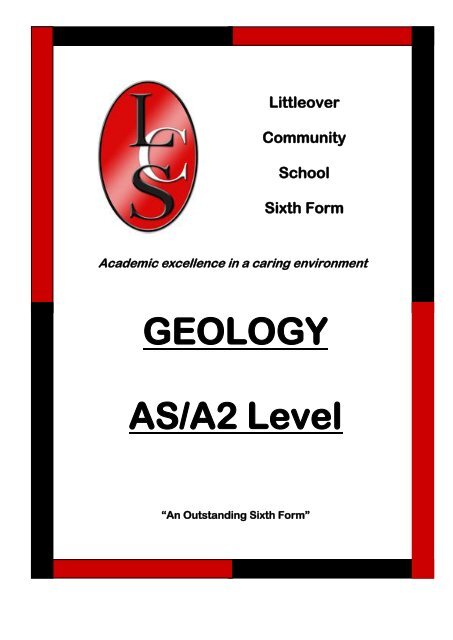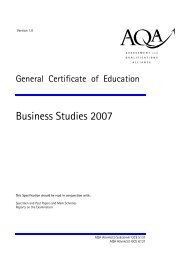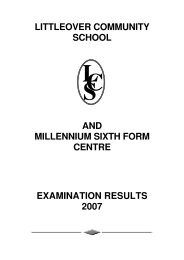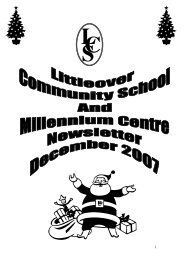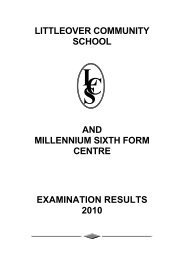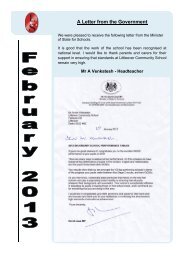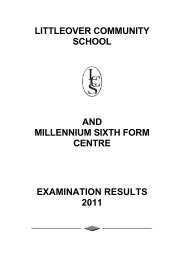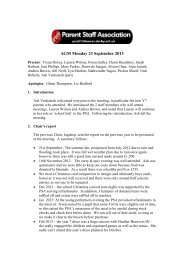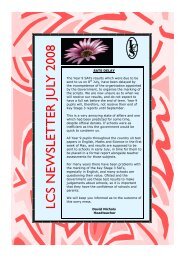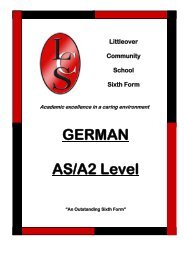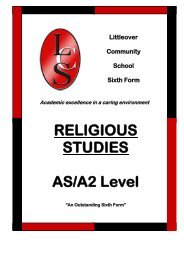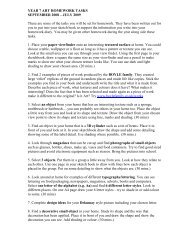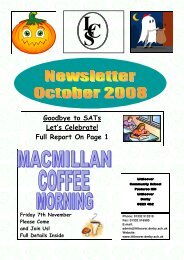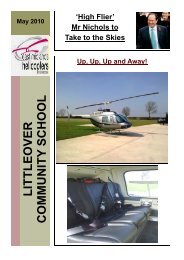Geology - Littleover Community School
Geology - Littleover Community School
Geology - Littleover Community School
Create successful ePaper yourself
Turn your PDF publications into a flip-book with our unique Google optimized e-Paper software.
<strong>Littleover</strong><br />
<strong>Community</strong><br />
<strong>School</strong><br />
Sixth Form<br />
Academic excellence in a caring environment<br />
GEOLOGY<br />
AS/A2 Level<br />
“An Outstanding Sixth Form”
Examination Board:<br />
WJEC<br />
Syllabus Content:<br />
AS<br />
<br />
<br />
<br />
GL Module 1 – Foundation <strong>Geology</strong><br />
The recording of changes and the dating of geological events.<br />
The global structure of the Earth and composition of its crust.<br />
The Earth’s energy sources and the resultant internal and external processes.<br />
GL Module 2 – Investigative <strong>Geology</strong><br />
Problem solving based on hand specimens, maps, photographs and other data.<br />
GL Module 3 – <strong>Geology</strong> and the Human Environment<br />
Knowledge with understanding of natural geological hazards and those caused by<br />
human activity and the means of predicting, monitoring and controlling them.<br />
An evaluation of the impact of geology in environmental planning and civil<br />
engineering projects.<br />
Skills of analysing and evaluating geological data related to site development and<br />
hazard assessment.<br />
Fieldwork comprises 2 one-day visits and a 2 night/3 day residential field study.<br />
A2<br />
<br />
<br />
<br />
GL Module 4 – Interpreting the Geological Record<br />
An extended concept of the rock cycle to deepen knowledge with understanding of<br />
igneous, sedimentary and metamorphic rocks.<br />
Extended skills in identifying and interpreting rocks using their compositions, textures<br />
and other diagnostic features.<br />
GL Module 5 – Geological Themes<br />
The integration of the content of units GL1, GL3, and GL4 to study major geological<br />
themes.<br />
GL Module 6 – Geological Investigations<br />
Fieldwork study – 1 week duration on the Isle of Arran.<br />
<strong>Geology</strong> is the branch of science concerned with the structure, evolution and dynamics of the<br />
Earth and with the exploitation of the mineral and energy resources that it contains. <strong>Geology</strong> is<br />
ideally suited to fulfil the educational purpose of demonstrating the relevance of science to<br />
society.<strong>Geology</strong> applies physical, chemical and biological principles to the investigation of the<br />
Earth, but also involves a distinctive scientific methodology invoking internal and external Earth<br />
processes to explain the evolution of the planet through geological time. The application of<br />
<strong>Geology</strong> to human activities and needs is widely addressed in the specification, providing for<br />
relevance and the development of a broad range of Key Skills.
Qualities required:<br />
<br />
<br />
<br />
<br />
<br />
<br />
A high level of interest, commitment, and organisation.<br />
Good communication, descriptive and precision skills.<br />
Enthusiasm for practicals, the ability to think laterally and record observations<br />
accurately.<br />
To work as an individual and apply concepts to problems.<br />
An appreciation of the natural environment.<br />
A willingness to participate in fieldwork.<br />
Method of Assessment:<br />
AS Units – 50% of A Level mark<br />
Module Method of Assessment Exam<br />
Month<br />
% of A<br />
Level<br />
Marks<br />
% of AS<br />
Level<br />
Marks<br />
GL1 Written paper (1 hour) June 17.5% 35%<br />
GL2<br />
GL2(a) External Assessment – Written<br />
Paper (1 hour 30 minutes) OR<br />
GL2(b) Internal assessment<br />
May 15% 30%<br />
GL3 Written Paper (1 hour 15 minutes) June 17.5% 35%<br />
A2 Units – 50% of A Level mark<br />
Module Method of Assessment Exam Month % of A<br />
Level Marks<br />
GL4 Written paper (2 hours) June 17.5%<br />
GL5 Written paper (2 hours) June 17.5%<br />
GL6<br />
Internal assessment. Geological<br />
fieldwork in Arran<br />
Undertaken<br />
October - April<br />
15%
Future Prospects:<br />
<strong>Geology</strong> is the study of the physical structure, history and make-up of the Earth.<br />
What can be more relevant than the very Earth that we live on? When a volcanic eruption or<br />
a Tsunami-generating earthquake hits the news headlines, wouldn’t it be wonderful to be<br />
able to interpret such events on a global scale? Having the understanding that these<br />
phenomena not only destroy life, but also have been essential in creating life on our planet<br />
is a fascinating overview to have.<br />
How intriguing is it to analyse rocks and the fossils that they contain and be able to<br />
reconstruct a 300 million year old environment and work out its past climate? Evidence of<br />
changes in the Earth’s climate is recorded in rocks throughout geological history, allowing<br />
the geologist to trace these changes through time and go on to predict (with help from other<br />
scientific disciplines), potential climatic fluctuations in the future.<br />
The study of <strong>Geology</strong> also allows us to be able to predict the location and quantities of<br />
natural resources such as oil, gas, coal, ore minerals, diamonds and building materials in<br />
the crust. The subject encompasses many of the other sciences including Biology,<br />
Chemistry and Physics and can lead to a career in:-<br />
Environmental Impact Assessment - understanding the type and level of contamination in<br />
water land and air and how the problems of contamination can be solved.<br />
Geophysics - the interpretation of sub-surface structures and their economic importance.<br />
Engineering <strong>Geology</strong> - the construction of sub-surface tunnels, pipelines, roads and<br />
buildings based on their geological setting.<br />
Mining <strong>Geology</strong> - exploration of the sub-surface for ore minerals (iron, lead, copper etc),<br />
gold, diamonds and other precious natural resources.<br />
Oil & Gas Exploration/Production - using geological techniques to find and extract oil,<br />
coal and gas from the subsurface.<br />
Geochemical Exploration - the chemical analysis of soils and waters for trace elements<br />
leading to exploitation of natural resources.<br />
Research


